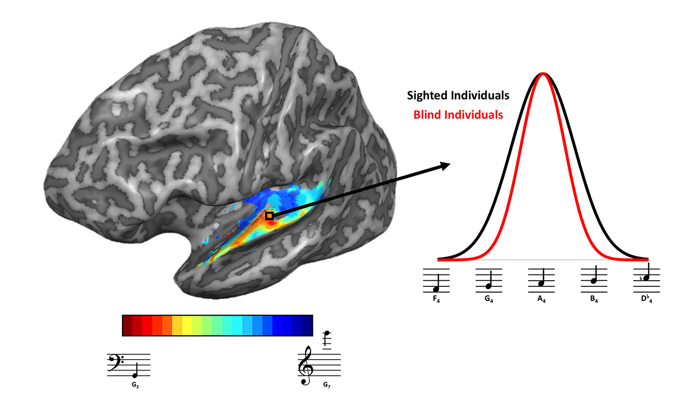Not everybody hears the same. Numerous studies have shown people who become blind early in life can experience enhanced auditory powers compared to sighted people, but a new experiment appears to have revealed the neural basis of this phenomenon for the first time.
The common assumption that people without sight have superior hearing isn't just an assumption; it's borne out by a body of research demonstrating just that, in addition to other advantages the condition appears to confer.
But while scientists have known for a long time that people with early onset blindness have more nuanced or accurate hearing, the brain mechanisms that enable this remain far from understood.
"There's this idea that blind people are good at auditory tasks, because they have to make their way in the world without visual information," says neuroscientist Ione Fine from the University of Washington.
"We wanted to explore how this happens in the brain."
To that end, Fine and her team used functional magnetic resonance (fMRI) imaging to examine activity in the auditory cortex – the part of the brain that processes auditory information – in both blind people and a control group of sighted people.
In their cohort, four of the blind participants had early onset blindness, and five had the condition anophthalmia, in which the eyes fail to develop.
In the experiment, these participants were played a number of pure tones resonating at different frequencies, while an fMRI device recorded their brain activity. A control group went through the same procedure.
When the researchers analysed the results, they found that the blind people in the experiment tended to process the tones in a narrower, more accurate bandwidth than sighted individuals, suggesting their sense of frequency tuning in the auditory cortex was better refined than the non-blind group.
"Our study shows that the brains of blind individuals are better able to represent frequencies," one of the team, psychology graduate student Kelly Chang, explains.
"For a sighted person, having an accurate representation of sound isn't as important because they have sight to help them recognise objects, while blind individuals only have auditory information.
This gives us an idea of what changes in the brain explain why blind people are better at picking out and identifying sounds in the environment."
 (Kelly Chang/UW)
(Kelly Chang/UW)
Left: red colours show brain regions responding more to to low-pitched tones, while blue-colour areas responded more to high-pitched tones. Right: overall, frequency tuning in blind participants was narrower than in sighted people.
It's worth noting we're only dealing with a small group of participants here, which we always need to bear in mind when considering the findings of studies.
But the team nonetheless suggests their results amount to the first evidence for systematic changes in neural tuning within the human auditory cortex as a result of blindness.
How the auditory cortex develops this form of neuroplasticity remains unknown, but in their paper, the team speculates it could be "a developmental adaptation to early blindness, the ongoing effects of visual deprivation, and/or differential auditory demands that result from being blind".
Future studies could help us get closer to understanding the basis of the brain's auditory adaptations observed here in greater detail, but for now at least, researchers have a new target to examine, even if there's still a lot left for us to learn.
"In blind individuals, more information needs to be extracted from sound – and this region seems to develop enhanced capacities as a result," Fine says.
"This provides an elegant example of how the development of abilities within infant brains is influenced by the environment they grow up in."
The findings are reported in The Journal of Neuroscience.
